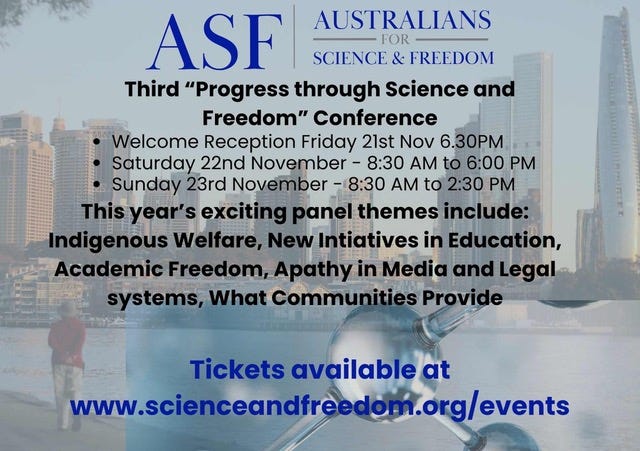Weekly Roundup
Oct 20 – 26, 2025
ANNOUNCMENTS
Australians for Science & Freedom - an organisation that I am a member of - will hold its Progress through Science and Freedom Conference on November 21-23 in Sydney, Australia. The conference will cover a range of topics including academic freedom, new initiatives in education, apathy in media culture, etc. I will deliver two presentations at the conference - one on my academic cancellation and another on the narrative surrounding women’s health being understudied and underfunded. Some of the other speakers include Warren Mundine, Anthony Dillon, Augusto Zimmerman, Kevin Donnelly, Damian Coory, and Fiona Girkin.
I hope to see you there!
LEADING ARTICLE
Young men, masculinity and misogyny
YouGov (UK)
PODCASTS AND PRESENTATIONS
Uncommon Knowledge
Episode description: This special episode of Uncommon Knowledge with Peter Robinson features our most requested guest: Hoover senior fellow and acclaimed economist and author Dr. Thomas Sowell. But rather than discussing Sowell’s many books, this conversation explores the full arc of Sowell’s life — from his childhood, along a dirt road in North Carolina, through his years in Harlem, the Marine Corps, Harvard, and ultimately to his long tenure at the Hoover Institution. Through rich storytelling and candid reflection, Sowell recounts his early struggles and triumphs: growing up in poverty yet surrounded by love, discovering books and ideas in a Harlem library, working his way through school and menial jobs, and eventually earning degrees from Harvard, Columbia, and the University of Chicago. Along the way, he shares how experience and evidence—not ideology—shaped his transformation from a young Marxist to one of America’s most influential champions of free markets and individual responsibility. The interview reveals the wit, humility, and intellectual rigor behind the man who has spent decades challenging conventional wisdom. From tales of family and resilience to his enduring skepticism of government programs, Sowell’s reflections illuminate a life defined by hard work, empirical reasoning, and independence of mind.
ARTICLES AND ESSAYS
Sex/Gender
Reproductive Rights End at Ejaculation: How Men Lost Control Over Parenthood
Men Are Good
How Motherhood Became A Diagnosis
Evie Magazine
What once was recovery and renewal is now coded as a psychiatric risk.
For men in crisis, VCU offers Feminism 101
Best Interest
Virginia Commonwealth counseling offers its men lessons on gender ideology and the patriarchy.
There’s an education crisis among young men – we need to face it
The Australian
Federal Court Rejects Biden-Era Redefinition of Sex
Reality’s Last Stand
The ruling could reshape the national debate over “gender-affirming care” and the reach of federal civil-rights law.
Politics
Fewer Americans See Diversity as a Business Priority
Gallup
Exercise Science
2026 ACSM Worldwide Fitness Trends: Future Directions of the Health and Fitness Industry
ACSM’s Health & Fitness Journal
Epidemiology
Implications of a New Obesity Definition Among the All of Us Cohort
JAMA Network Open
Abstract: Importance: A recent Lancet Commission proposed an obesity definition that integrates body mass index (BMI [calculated as weight in kilograms divided by height in meters squared]) with anthropometric measures, marking a paradigm shift in how obesity is conceptualized and classified. Objective: To determine the clinical implications of the new definition of obesity. Design, setting, and participants: This population-based longitudinal cohort study leveraged data from the All of Us cohort. Participants in All of Us with complete anthropometric data were enrolled between May 31, 2017, and September 30, 2023, with a median follow-up of 4.0 (IQR, 1.7-4.7) years. Exposure: Obesity classified by traditional and new definitions. Main outcomes and measures: Obesity was defined by the new framework using sex- and race-specific thresholds as (1) BMI above the traditional obesity threshold plus at least 1 elevated anthropometric measure or BMI greater than 40 (BMI-plus-anthropometric obesity) or (2) at least 2 elevated anthropometric measures with BMI below the traditional obesity threshold (anthropometric-only obesity). Obesity was categorized as clinical or preclinical based on organ dysfunction and/or physical limitation. Results: Among 301 026 individuals (183 633 [61.0%] female; median age, 54 [IQR, 38-65] years), 206 361 (68.6%) had obesity according to the new definition vs 128 992 (42.9%) according to the traditional definition, due to inclusion of individuals with anthropometric-only obesity. Among the overall cohort, 108 650 individuals (36.1%) had clinical obesity according to the new definition; this prevalence increased with age, as 24 498 of 45 018 individuals 70 years or older (54.4%) had clinical obesity. Compared with no obesity, odds ratios of organ dysfunction were 3.31 (95% CI, 3.24-3.37) for BMI-plus-anthropometric obesity and 1.76 (95% CI, 1.73-1.80) for anthropometric-only obesity per the new definition. In longitudinal analyses, clinical obesity conferred elevated risks of incident diabetes (adjusted hazard ratio [AHR], 6.11; 95% CI, 5.67-6.60), cardiovascular events (AHR, 5.88; 95% CI, 5.38-6.43), and all-cause mortality (AHR, 2.71; 95% CI, 2.41-3.05) compared with no obesity or organ dysfunction. Preclinical obesity was also associated with increased risks of incident diabetes (AHR, 3.32; 95% CI, 3.08-3.58) and cardiovascular events (AHR, 1.40; 95% CI, 1.27-1.55), albeit to a lesser degree. Conclusions and relevance: In this cohort study, adoption of the new definition of obesity significantly increased obesity prevalence with major implications for clinical practice and public policy. The new framework effectively stratified individuals at high risk of organ dysfunction and long-term complications while introducing anthropometric-only obesity and preclinical obesity as distinct entities warranting further study.
RUBBISH BIN
Gender and Education
Abstract: Education in the twenty-first Century has been framed by a persistent crisis narrative concerning male underachievement. In response, educators have trialled various solutions-oriented approaches often leaning on a privatized industry of pseudo-experts who offer broad solutions to improve boys’ academic performance and well-being. Despite their prevalence, little thorough investigation has been conducted into the practices and messages promoted by these consultants. This paper presents a singular case study of the persuasive techniques used by one self-described male expert in boyhood and academic achievement. Using Thematic Analysis (TA) and Feminist Post-Structural Discourse Analysis (FPDA), we identify dominant, competing, and oppositional discourses he posits, illustrating how gender norms are constructed and reinforced within educational spaces, shaping boys’ lived experiences and delimiting the possibilities for their identities and opportunities.
(*See my X post here for one reason why I tossed this paper in the Rubbish Bin.)
SUPPORT THE NUZZO LETTER
If you appreciated this content, please consider supporting The Nuzzo Letter with a one-time or recurring donation. Your support is greatly appreciated. It helps me to continue to work on independent research projects and fight for my evidence-based discourse. To donate, click the DonorBox logo. In two simple steps, you can donate using ApplePay, PayPal, or another service. Thank you!
If you prefer to donate to a specific project, please see the Go Fund Me page for my current research on sex differences in muscle strength in children.







Thanks Jim, another round of excellent links!
Thank you, James, Congratulations on your upcoming presentations in November.